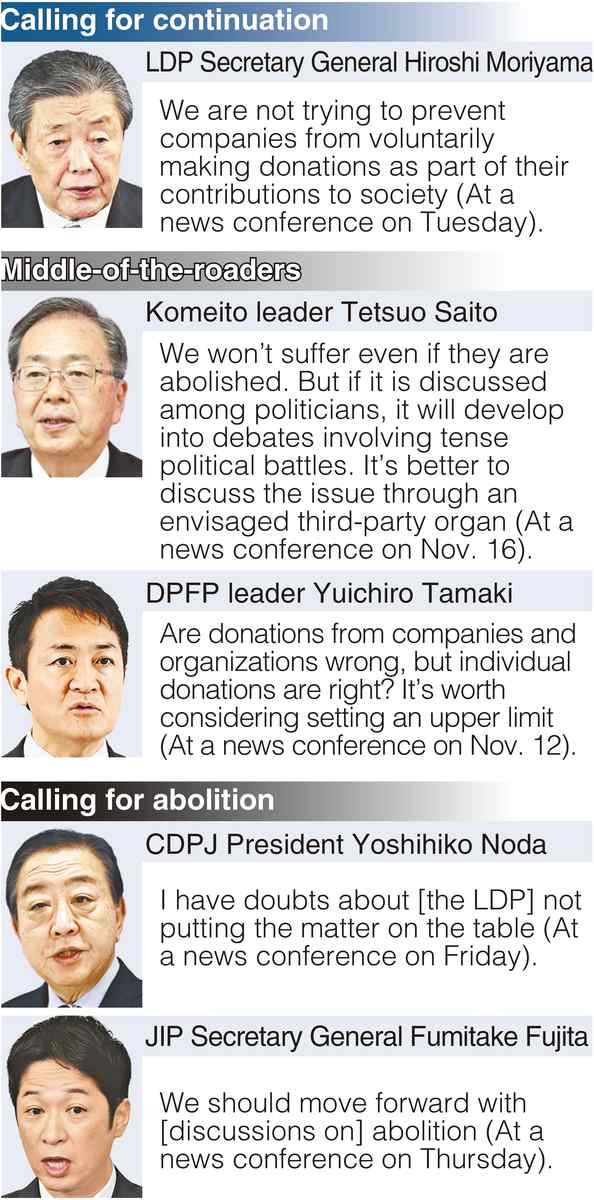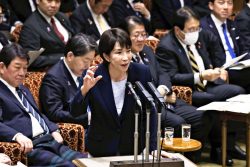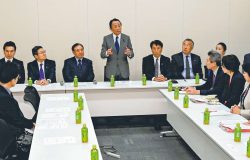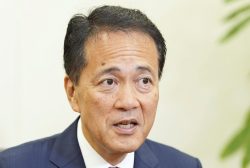Japanese Political Parties At Odds Over Corporate Donations; Issue May Be Shelved to Prioritize Agreement on Other Points

Party executives’ statements
2:00 JST, November 25, 2024
Ruling and opposition parties are set to begin negotiations on revising the Political Funds Control Law as early as this week, but wide gaps remain over the issue of political donations from companies and organizations.
The ruling Liberal Democratic Party is calling for maintaining the donations, while the Constitutional Democratic Party of Japan wants them abolished. Due to such significant policy differences, the parties may prioritize bringing about what they can agree on — such as getting rid of the political activity funds that are given to individual lawmakers by parties — and shelve the issue of donations from companies and organizations.
‘Hotbed for corruption’
“I have doubts about the [LDP’s] stance of not putting the matter on the table,” said CDPJ President Yoshihiko Noda at a press conference on Friday. Noda was criticizing the LDP for not including the abolition of donations from companies and organizations in its draft proposal for political reform.
The CDPJ is seeking to halt donations from companies and organizations as a pillar of its political reform effforts. Party Secretary General Junya Ogawa has called such contributions a “hotbed for corruption.”
Japan Innovation Party Secretary General Fumitake Fujita also expressed his willingness to discuss stopping such donations. “The CDPJ is keen on this point, so we believe we should move forward on it,” Fujita said at a news conference on Thursday.
However, the LDP insists that donations from companies and organizations should be maintained, on the grounds of a 1970 Supreme Court ruling involving political contributions from Yawata Iron & Steel Co. The judgement stated that a private firm is generally free to make political donations.
In a news conference on Tuesday, LDP Secretary General Hiroshi Moriyama said that his party is not trying to prevent companies from voluntarily making donations as part of their contributions to society. There were no calls to halt such donations at a general meeting of the party’s political reform headquarters on Thursday.
Lowering upper limit
Tetsuo Saito, leader of the LDP’s junior coalition partner Komeito, said at a news conference on Nov. 16 that his party would not suffer even if donations from companies and organizations were abolished, because Komeito does not receive any. But Saito went on to say that it would be better to discuss the issue through an envisaged third-party organ.
“If it is discussed among politicians, it will develop into debates involving tense political battles,” he said.
Yuichiro Tamaki, head of the Democratic Party for the People, said that he does not oppose the abolition of such donations if “it is agreed upon by all the party members.” But he also showed some understanding toward maintaining the system.
“It’s worth considering setting an upper limit,” Tamaki said at a press conference on Nov. 12. Currently, the total amount of donations per year is limited to ¥7.5 million to ¥100 million, depending on companies’ capital stock and other conditions. Tamaki is apparently thinking about lowering the upper limit.
Focusing on points of agreement
Prime Minister Shigeru Ishiba, who also serves as LDP president, hopes to see swift action at least in the areas where parties would be able to agree, such as the abolition of political activity funds. Ishiba thinks it would be difficult to bridge the gap among parties concerning donations from companies and organizations, and has reportedly told close aides that it would be “impossible within the year” for the parties to agree on the issue.
Within the CDPJ, some members are taking a hardline position, saying that negotiations will break down if no progress is made on stopping donations from companies and organizations. However, one veteran member said, “We need to achieve results in some areas that can be reformed.”
There seems to be a war of nerves going on between ruling and opposition parties.
"Politics" POPULAR ARTICLE
-

Japan to Support Central Asian Logistics Route That Bypasses Russia, Plan to Be Part of Upcoming Summit in Tokyo
-

Japan to Tighten Screening of Foreigners’ Residential Status by Providing Information of Nonpayment of Taxes
-

Takaichi Cabinet Approval Holds at 72% as Voters Back Aggressive Fiscal Stimulus, Child Benefits
-

Chinese, Russian Bombers Flew Unusual Path by Heading Toward Tokyo; Move Likely Meant to Intimidate Japan
-

Takaichi Meets Many World Leaders at G20 Debut in Johannesburg; Speaks with Heads of Countries Including Italy, U.K., Germany, India
JN ACCESS RANKING
-

Keidanren Chairman Yoshinobu Tsutsui Visits Kashiwazaki-Kariwa Nuclear Power Plant; Inspects New Emergency Safety System
-

Imports of Rare Earths from China Facing Delays, May Be Caused by Deterioration of Japan-China Relations
-

University of Tokyo Professor Discusses Japanese Economic Security in Interview Ahead of Forum
-

Tokyo Economic Security Forum to Hold Inaugural Meeting Amid Tense Global Environment
-

Japan Pulls out of Vietnam Nuclear Project, Complicating Hanoi’s Power Plans





















